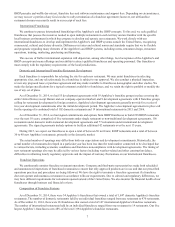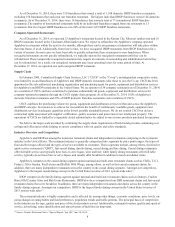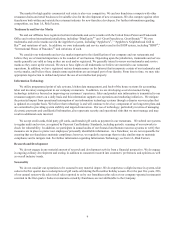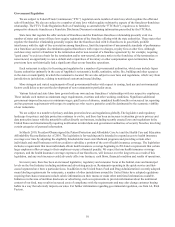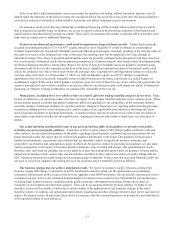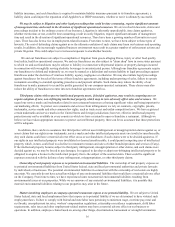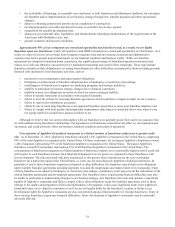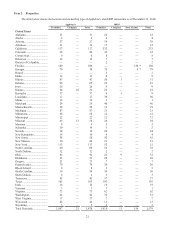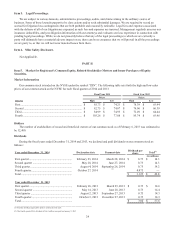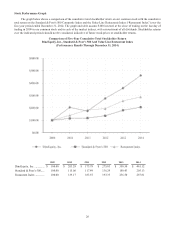IHOP 2014 Annual Report Download - page 35
Download and view the complete annual report
Please find page 35 of the 2014 IHOP annual report below. You can navigate through the pages in the report by either clicking on the pages listed below, or by using the keyword search tool below to find specific information within the annual report.16
liability insurance, and each franchisee is required to maintain liability insurance pursuant to its franchise agreements, a
liability claim could injure the reputation of all Applebee's or IHOP restaurants, whether or not it is ultimately successful.
We may be subject to litigation and other legal proceedings that could be time consuming, require significant amounts
of management time and result in the diversion of significant operational resources. We are involved in lawsuits, claims and
proceedings incident to the ordinary course of our business. Litigation is inherently unpredictable. Any claims against us,
whether meritorious or not, could be time consuming, result in costly litigation, require significant amounts of management
time and result in the diversion of significant operational resources. There have been a growing number of lawsuits in recent
years. There has also been a rise in employment-related lawsuits. From time to time, we have been subject to these types of
lawsuits. The cost of defending claims against us or the ultimate resolution of such claims may harm our business and operating
results. In addition, the increasingly regulated business environment may result in a greater number of enforcement actions and
private litigation. This could subject us to increased exposure to stockholder lawsuits.
We and our franchisees are subject to complaints or litigation from guests alleging illness, injury or other food quality,
food safety, health or operational concerns. We and our franchisees are also subject to "dram shop" laws in some states pursuant
to which we and our franchisees may be subject to liability in connection with personal injuries or property damages incurred
in connection with wrongfully serving alcoholic beverages to an intoxicated person. Although our franchise agreements require
our franchisees to defend and indemnify us, we may be named as a defendant and sustain liability in legal proceedings against
franchisees under the doctrines of vicarious liability, agency, negligence or otherwise. We may also initiate legal proceedings
against franchisees for breach of the terms of their franchise agreements, including underreporting of sales, failure to operate
restaurants according to standard operating procedures and payment defaults. Such claims may reduce the ability of our
franchisees to make payments to us and the profits generated by our company-operated restaurants. These claims may also
reduce the ability of franchisees to enter into new franchise agreements with us.
Third-party claims with respect to intellectual property assets, if decided against us, may result in competing uses or
require adoption of new, non-infringing intellectual property, which may in turn adversely affect sales and revenues. We
regard our service marks and trademarks related to our restaurant businesses as having significant value and being important to
our marketing efforts. To protect our restaurants and services from infringement, we rely on contracts, copyrights, patents,
trademarks, service marks and other common law rights, such as trade secret and unfair competition laws. We have registered
certain trademarks and service marks in the United States and foreign jurisdictions; however, effective intellectual property
protection may not be available in every country in which we have or intend to open or franchise a restaurant. Although we
believe we have taken appropriate measures to protect our intellectual property, there can be no assurance that these protections
will be adequate.
In addition, there can be no assurance that third parties will not assert infringement or misappropriation claims against us, or
assert claims that our rights in our trademarks, service marks and other intellectual property assets are invalid or unenforceable.
Any such claims could have a material adverse effect on us or our franchisees if such claims were to be decided against us. If
our rights in any intellectual property were invalidated or deemed unenforceable, it could permit competing uses of intellectual
property which, in turn, could lead to a decline in restaurant revenues and sales of other branded products and services (if any).
If the intellectual property became subject to third-party infringement, misappropriation or other claims, and such claims were
decided against us, we may be forced to pay damages, be required to develop or adopt non-infringing intellectual property or be
obligated to acquire a license to the intellectual property that is the subject of the asserted claim. There could be significant
expenses associated with the defense of any infringement, misappropriation, or other third-party claims.
Ownership of real property exposes us to potential environmental liabilities. The ownership of real property exposes us
to potential environmental liabilities from United States federal, state and local governmental authorities and private lawsuits
by individuals or businesses. The potential environmental liabilities in connection with the ownership of real estate are highly
uncertain. We currently do not have actual knowledge of any environmental liabilities that would have a material adverse effect
on the Company. From time to time, we have experienced some non-material environmental liabilities resulting from
environmental issues at our properties. While we are unaware of any material environmental liabilities, it is possible that
material environmental liabilities relating to our properties may arise in the future.
Matters involving employees at company-operated restaurants expose us to potential liability. We are subject to United
States federal, state and local employment laws that expose us to potential liability if we are determined to have violated such
employment laws. Failure to comply with federal and state labor laws pertaining to minimum wage, overtime pay, meal and
rest breaks, unemployment tax rates, workers' compensation regulations, citizenship or residency requirements, child labor
requirements, sales taxes and other employment-related matters may have a material adverse effect on our business or
operations. In addition, employee claims based on, among other things, discrimination, harassment or wrongful termination



